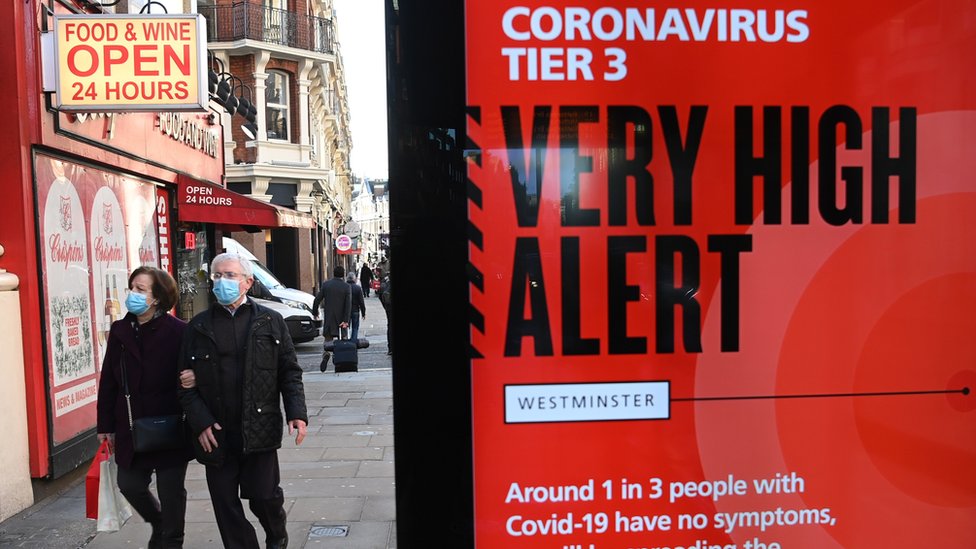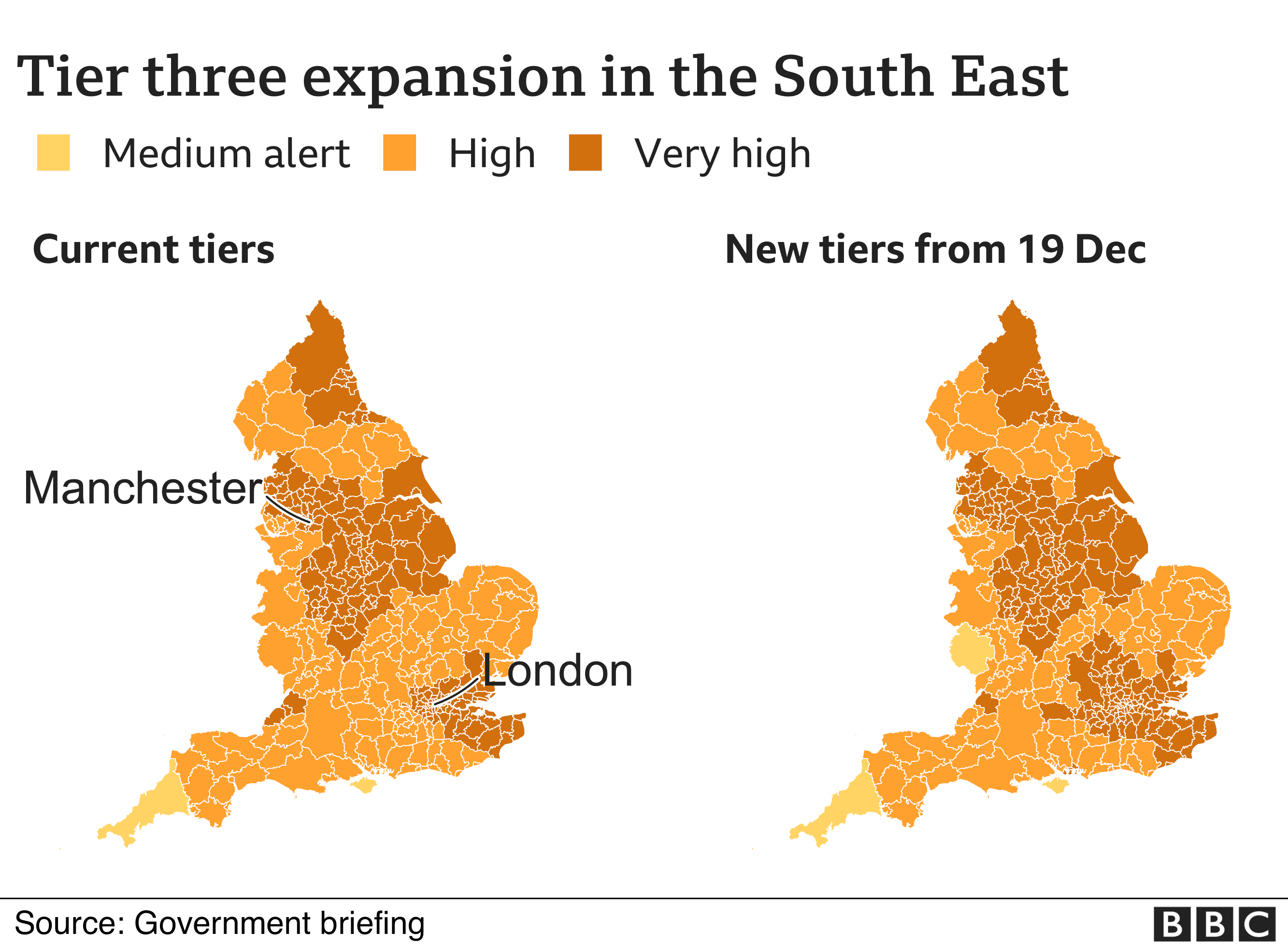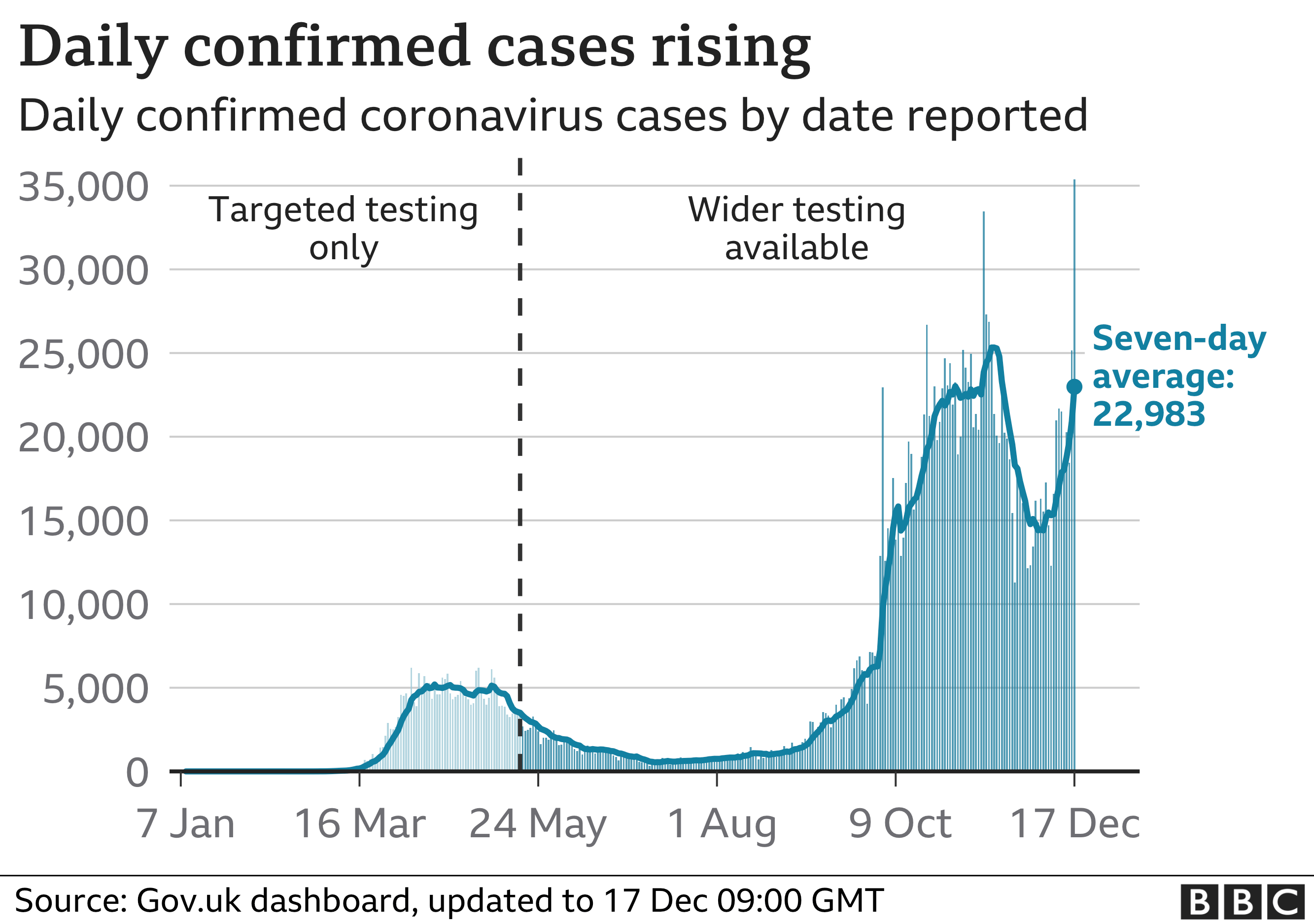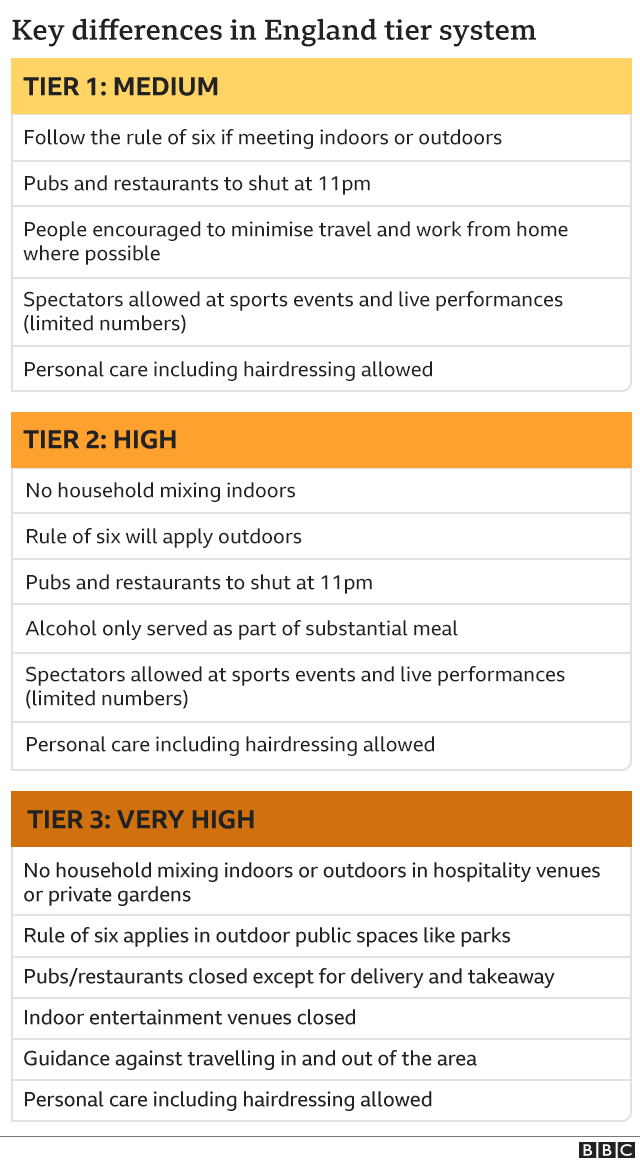
Millions of people across the UK are preparing for tougher coronavirus restrictions amid growing concern about the rising number of cases.
Some 38 million people in England will be subject to the nation's strictest measures - tier three - from Saturday.
Northern Ireland will begin a six-week lockdown from 26 December, similar to the "sustained" shutdown in March.
Wales had already announced a lockdown from 28 December which will be reviewed every three weeks and has no end date.
In Scotland, the government has warned that tougher restrictions - including a potential lockdown - after the festive period cannot be ruled out.
When asked about the prospect of a national lockdown in England, government minister Nick Gibb said the tier system was "very effective" but nothing was ruled out.
The new six-week lockdown in Northern Ireland will include closing non-essential shops and close-contact services such as hair salons, while pubs, cafes and restaurants will be restricted to takeaway. services.
The first week of the lockdown, running until 2 January, will see even tighter measures with essential shops, including supermarkets, having to close each day by 20:00 GMT.
No sporting events will be permitted at all - even at elite level - with people being urged only to leave their home for essential reasons.
In Wales, non-essential shops will close from the end of trading on Christmas Eve, with an alert level four lockdown starting four days later.
Scotland's Covid levels and restrictions will be reviewed on Tuesday.


The decision by all four UK nations to relax restrictions and allow more mixing for five days over Christmas has prompted concern that it will fuel a further surge in case numbers, with medical professionals warning the NHS is already under significant pressure.
Dame Donna Kinnair, chief executive of the Royal College of Nursing, said relaxing the measures would "undoubtedly lead to more cases, more pressure on NHS and care services, and more deaths".Millions to be subject to toughest Covid rules
Dr Martin Kelly, a consultant respiratory physician in Londonderry, told BBC Radio 4's Today programme: "Right in the mouth of Christmas we're seeing a significant further surge in numbers which is already putting the service under significant pressure."
Dr Nick Lyons, a health board medical director in south Wales, said things were similar in his region, were non-urgent procedures have been cancelled. The intensive care units "were basically full with Covid patients" while the field hospital was "roughly at half its total capacity", he told Today.
In England, Dr Ganesh Suntharalingam, outgoing chair of the Intensive Care Society, said some hospitals were already operating at capacity - or slightly over - and the prospect of adding a third spike on top of that was "a serious concern".
Rising cases

Official figures show infection rates went up in every region of England last week, apart from Yorkshire and the Humber.
London had the highest rate, at 319.3 cases per 100,000 people in the week to December 13, up from 199.9 in the previous week. The rate went from 152.9 to 249.1 in eastern England, and from 167.6 to 238.7 in the South East.
From 00:01 GMT on Saturday, Bedfordshire, Buckinghamshire, Berkshire and Hertfordshire will move up a tier, along with parts of Surrey, East Sussex, Cambridgeshire and Hampshire.


Meanwhile, the National Institute for Health and Care Excellence has advised doctors to offer patients in hospital with coronavirus a follow-up six weeks later to check for "long Covid" symptoms.
NICE says the longer-term effects can be "significant", and has identified 28 of the most common symptoms, from breathlessness and dizziness to chest pain.

- SOCIAL DISTANCING: Can I give my friends a hug?
- FACE MASKS: When do I need to wear one?
- TESTING: How do I get a virus test?
- SYMPTOMS: What are they and how to guard against them?

The UK recorded a further 532 coronavirus deaths on Thursday, taking the total number of people who have died within 28 days of testing positive for the virus to 66,052.
A further 35,383 cases were also recorded on Thursday, up from 25,161 on the previous day.
This figure includes 11,000 positive cases from Wales that were not previously recorded in official figures due to maintenance work on Public Health Wales' computer systems at the end of last week.

- VACCINE HESITANCY: Why do some people have concerns about taking a new coronavirus vaccine?
- BRAND NEW THE VICAR OF DIBLEY: Geraldine returns to offer her thoughts about lockdown and social distancing


How will you be affected when your area moves to tier 3? Share your experiences by emailing haveyoursay@bbc.co.uk.
Please include a contact number if you are willing to speak to a BBC journalist. You can also get in touch in the following ways:
- WhatsApp: +44 7756 165803
- Tweet: @BBC_HaveYourSay
- Please read our terms & conditions and privacy policy
If you are reading this page and can't see the form you will need to visit the mobile version of the BBC website to submit your question or comment or you can email us at HaveYourSay@bbc.co.uk. Please include your name, age and location with any submission.
https://news.google.com/__i/rss/rd/articles/CBMiJmh0dHBzOi8vd3d3LmJiYy5jby51ay9uZXdzL3VrLTU1MzU4OTY40gEqaHR0cHM6Ly93d3cuYmJjLmNvLnVrL25ld3MvYW1wL3VrLTU1MzU4OTY4?oc=5
2020-12-18 08:13:00Z
52781248371985
Tidak ada komentar:
Posting Komentar